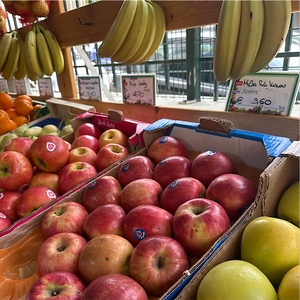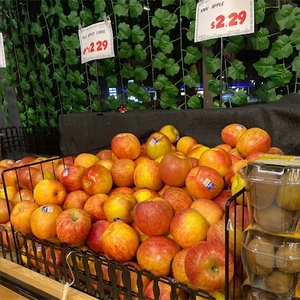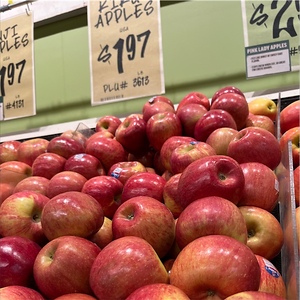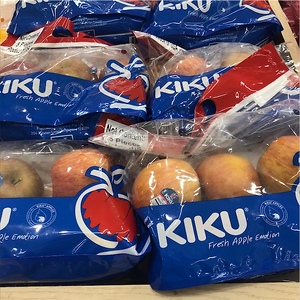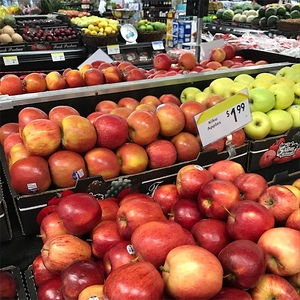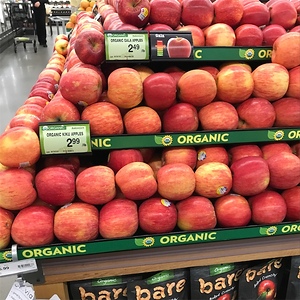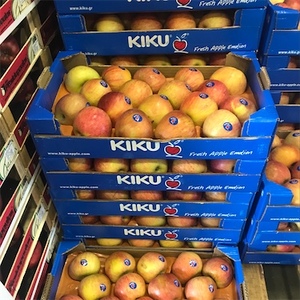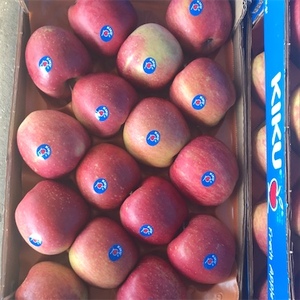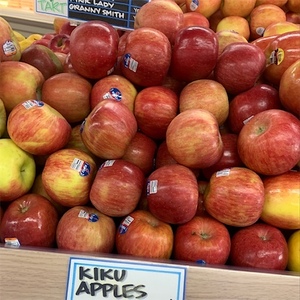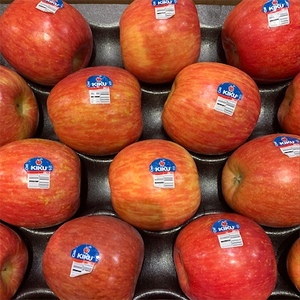

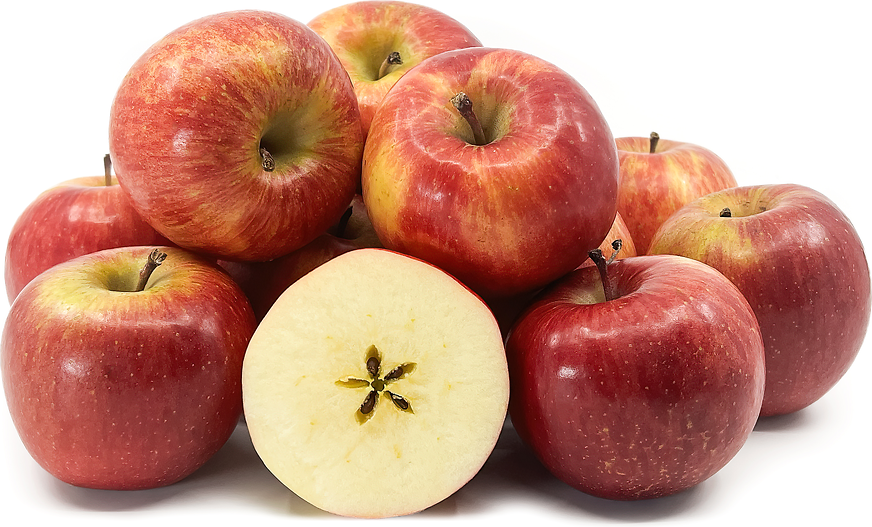
Kiku® Apples
Estimated Inventory, cs : 0
Description/Taste
Kiku® apples are a medium to large varietal, averaging 10 to 12 centimeters in diameter, and have a round to ovate shape with broad, flat shoulders, tapering slightly to a wide base. The fruit’s stem is slender, dark brown, and woody, connecting into the stem cavity, occasionally filled with a green-brown russet. The skin is semi-thin, smooth, glossy, and taut, showcasing a golden yellow base with large patches of ruby-red blush. The blush is filled with opaque and translucent red hues, depending on sun exposure, and is covered in dark red striping, The skin is also enveloped in pale lenticels scattered across the surface. Underneath the skin, the yellow to ivory flesh is firm, coarse, and aqueous with a crisp, crunchy, and succulent consistency. The flesh also encases a small central core filled with black-brown seeds and occasionally displays a honey or water core. Kiku® apples emit a robust, sweet aroma with floral overtones when ripe. The variety is known for its intense sweetness. Commercial apples typically range from 12 to 14% Brix, a measurement of sugar levels, but Kiku® apples range from 14 to 17%, giving them a sugary-sweet taste balanced with some acidity.
Seasons/Availability
Kiku® apples are grown in both hemispheres, providing availability in select markets year-round.
Current Facts
Kiku® apples, botanically classified as Malus domestica, are a sport of Fuji apples belonging to the Rosaceae family. The natural mutation was discovered growing on a branch in a Japanese orchard and was nurtured by an Italian grower to develop a new apple variety in the late 20th century. Kiku® apples are a proprietary brand name, and only select growers worldwide are approved and licensed to cultivate the fruits commercially. Initially, Kiku® apples were chosen as a new variety for their rich, dark red coloring, striped skin, and sweet taste. After their release in the early 21st century, the variety became a favored club or brand apple, sold at premium prices in limited quantities as a dual-purpose apple. In the modern day, Kiku® apples are found in markets worldwide and can be used in sweet or savory dishes, adding texture, flavor, and aroma to recipes.
Nutritional Value
Kiku® apples are a source of potassium to balance fluid levels within the body, fiber to regulate the digestive tract, and vitamin A to maintain healthy organs. The variety also provides calcium to build strong bones and teeth, vitamin C to boost the immune system, iron to develop the protein hemoglobin for oxygen transport through the bloodstream, and other nutrients, including phosphorus, magnesium, riboflavin, vitamin E, thiamin, and vitamin K. The apple’s pigmented skin indicates the presence of anthocyanins, natural compounds with antioxidant-like properties to protect the cells against the damage caused by free radicals.
Applications
Kiku® apples have a sweet, balanced taste suited for fresh and cooked preparations. The variety is typically consumed straight out of hand and is enjoyed as a snack, a crunchy addition to sweet and savory dishes, and desserts. Kiku® apples can be shredded into slaws, tossed into salads, or served on charcuterie plates with cheeses such as parmesan, edam, or cheddar. The apples can also be sliced and served with nut butter, layered into grilled cheeses and paninis, or topped over crostini as a sweet appetizer. Try blending and freezing Kiku® apples into sorbet or adding them to smoothies. In addition to fresh preparations, Kiku® apples retain their shape when cooked and are popularly baked into muffins, cakes, pancakes, and bread. They can also be cooked into tarts, pies, crisps, and fritters. Kiku® apples add sweet notes to applesauce, jams, and chutneys, and the fruits complement savory flavors in risotto, soups, and roasted meat dishes. Kiku® apples are also processed into branded juices, jams, granitas, chips, and vinegar. Kiku apples pair well with herbs such as marjoram, basil, chervil, chives, rosemary, and parsley, potatoes, celery, limes, aromatics including garlic, ginger, onions, and shallots, nuts such as almonds, pistachios, and pecans, and spices such as cinnamon, nutmeg, cloves, and allspice. Whole, unwashed Kiku apples will keep up to three months when stored in a cool, dry, and dark location such as a cellar or refrigerator.
Ethnic/Cultural Info
Kiku® apples were named after the Japanese word for “Chrysanthemum.” Kikus, also known as Kiku-no-Hana, are a sacred bloom in Japan and are a symbol of royalty. The flower was introduced to Japan from China sometime around 400 CE, and it is thought that Buddhist monks carried it as a medicinal ingredient. Legend has it that a young boy in China drank liquid that came from a Chrysanthemum leaf and lived for 800 years without aging. This legend made the flowers a popular medicinal ingredient and symbol of health and longevity. In the Kamakura and Meiji periods, Chrysanthemums were adopted as a symbol of the Japanese royal family and were used on thrones, government seals, passports, and coins. Kiku® apples were named after the regal bloom as a nod to their site of origin in Japan, and the apples also embody health-forward imagery as they are branded as a nutritious addition to daily diets that can contribute to a long life.
Geography/History
Kiku® apples are native to Japan and are a red sport of the Fuji apple. Italian apple grower Louis Braun discovered the sport growing on a tree in a Japanese Fuji apple orchard in 1990. Braun appreciated the fruit’s striped appearance and sweet taste and decided to propagate the apples. The red sport branch was carried back to Braun’s home in South Tyrol, Italy, and was planted in his orchard. Braun spent several years propagating the new variety and collaborated with research institutes to evaluate and test the apples as a possible commercial cultivar. The new variety was eventually released under the brand name Kiku®, and the name is a registered trademark of KIKU® Srl-GmbH, Italy. Since their release, only select growers are licensed and approved to sell the cultivar. Kiku® apples are primarily cultivated in Italy and were introduced to American markets in 2010. Today, three companies are authorized to grow and sell the variety in the United States: CMI Orchards in Washington State, Rice Fruit Company in Pennsylvania, and Applewood Orchards in Michigan. Kiku® apples are also grown in the southern hemisphere in New Zealand and Chile for year-round production. The fruits are sold through select grocers and distributors.
Recipe Ideas
Recipes that include Kiku® Apples. One



